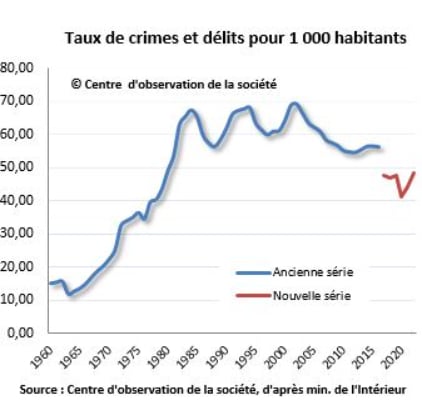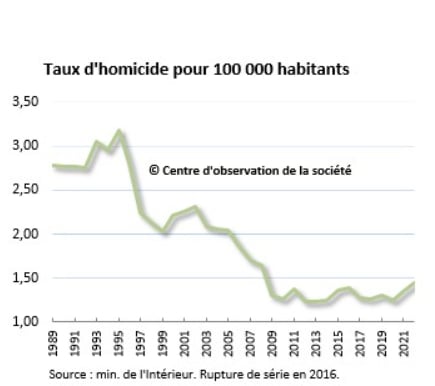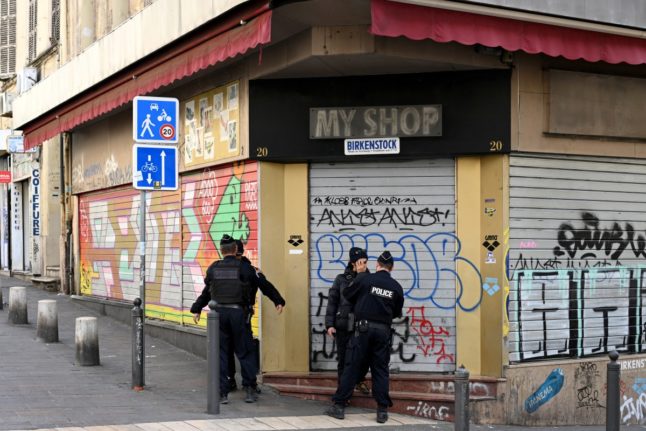Le Figaro writes: “The most recent (crime) figures (in France) indicate a society in the grip of savagery.”
Marine Le Pen states: “Immigration has exploded and savagery (ensauvagement) has increased.”
Is that really so? Facts – remember those? – suggest otherwise.
The murder rate in France is less than half of what it was 30 years ago. Crime statistics exploded in the 1970s and 1980s They fell sharply with the start of the new century and are now rising again.

They remain far below what they were in the mid-1990s (also known as The Good Old Days).

Two horrible and tragic events in recent days involving teenagers in Montpellier and in the south Paris suburbs have ignited one of France’s frequent moral panics about crime and violence.
Because both the incidents involved young French Muslims – including, in one case, Muslim girls – they have generated a festival of delighted mock-horror in French far-right social media (aka La Fachosphère) and in the columns of the once sensible, centre-right newspaper, Le Figaro.
Some members of the government, terrified of seeming weak or complacent, have also taken to using the racially-loaded terms “savagery” and “decivilisation”.
The violence in some of France’s multi-racial suburbs or banlieues is real. It should neither be accepted nor denied.
There is a new fashion for extreme violence amongst a minority of 13 to 15-year-olds. It is promoted by and then displayed on social media.
The new willingness of some teenage girls to emulate the violent behaviour long associated with teenage boys is disturbing. Gender equality has its limits.
But the claim that France is descending into an apocalyptic twilight world of migrant-driven violence is nonsense. Or rather, it is a lie calculated to stir racial prejudice and hatred. The use of the word “savage” is not accidental.
Violence exists; it has always existed. Some of the new forms of violence are disturbing. But there is no evidence for the repeated Le Figaro/Le Pen claims that France is a “society in the grip of savagery” or submerged by an unprecedented wave of migration-driven violence.
Overall crime figures have jumped in each of the last two years. The numbers are worrying but they are scarcely enormous.
The crime rate zoomed from the 1970s, undulated in the 1990s, fell sharply just after the millenium and has now started rising again. It remains well below what it was in the mid-1990s.
Violent attacks, provoked and unprovoked, including domestic violence, have risen in the last two years. Violent robberies are down. So are unarmed robberies. Sexual crimes are up by 7 percent but this may partly reflect a greater willingness to report them.
Murders have increased from 803 in 2014 to 1,033 last year. They are still way below the mid-1990s when there around 1,400 murders a year in France.
The homicide rate (murders by 100,000 population) is now 1.5, which is broadly in line with other European countries. In the 1995, it was over 3 per 100,000. You had twice as much risk of being murdered in France 30 years ago than you do now.
When did you last see a headline saying: “Good news, the French murder rate has been halved in 30 years”?
Some parts of France are more violent than others – especially the impoverished overseas départements. The Marseille area, where drug-related gang killings are rife, the homicide rate is 4.1 per 100,000.
READ ALSO Does Marseille deserve its ‘dangerous’ reputation?
(For comparison, in New Orleans, the murder rate is a staggering 53.3. Overall, the rate in the United States is four times that of France, 6.4 deaths per 100,000.)
What has also changed in the last 20 years is the willingness of politicians to exploit, and distort, crime figures and high-profile acts of violence for political gain. That began with President Jacques Chirac’s campaign for re-election in 2002, which blamed the Socialist PM Lionel Jospin for being weak on crime when crime figures were falling.
In one recent poll, 90 percent of French people said that they felt that the country was becoming more violent. Right-wing social-media silos are to blame. So is the constant drum-beat that “immigration equals violence” from Le Pen, her rival Eric Zemmour and some politicians on the centre right.
The supposedly moderate Le Figaro now gives exaggerated space on its front page or its website to any violent incident in France – especially those involving racial minorities.
Some migrants and second-generation migrants are violent or criminal but violence and criminality grows from poverty and marginalisation. The boom in violence in the 1970s and 1980s is attributed not to immigration but to the sharp rise in unemployment.
It would be idle to deny that the banlieues can be violent and sometimes scary places. They also home to hundreds of thousands of hard-working men and women who commute to menial and essential jobs in Paris and other cities every day. They, not readers of Le Figaro, tend to be the prime victims of banlieue violence, which mostly remains within the banlieues.
So let us stand Marine Le Pen’s logic on its head.
France now has more people of migrant origin than it did in 1995. Violent crimes, and especially murders, are less common than they were then.
Conclusion: migration has made France a safer and a more peaceful place.



 Please whitelist us to continue reading.
Please whitelist us to continue reading.
Member comments